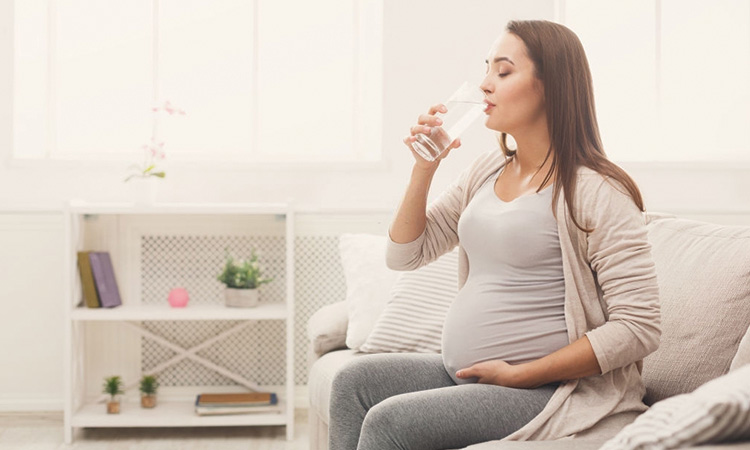Even though the nine months of pregnancy bring the onslaught of many emotions and feelings, we can’t ignore the challenges of pregnancy. Be it ensuring a pregnancy-safe diet to fighting depression, a pregnant woman goes through several issues and faces turmoil. Dehydration during pregnancy is one such challenge that can risk your and your unborn baby’s life in ways more than one.
The moment you learn of your pregnancy, you develop motherly feelings towards your unborn baby. Starting from the desire to eat healthy to caressing your non-existent baby bump, all that you can think of is your baby’s health and proper growth. The mere thought of motherhood is perhaps the reason behind your protective nature. You leave no stone unturned during the entire pregnancy to ensure that the fetus is healthy and safe. You even change your lifestyle, sleeping habits, and many other things to provide comfort to your baby.
Causes Of Dehydration In Pregnant Women
Dehydration during pregnancy is not an uncommon issue. Several reasons are there, which cause a decrease in the number of fluids during pregnancy. Here, we have explained some of the main reasons why pregnant females often suffer from dehydration.
- Morning sickness: There are several stages of morning sickness, starting from mild to severe. However, no matter how much you are throwing up early morning, your body is deprived of proper fluids. Prolonged cases of morning sickness can cause dehydration
- Reduced water intake: Sometimes, pregnant women lose the thirst and hence, their overall water consumption is below average. This causes an imbalance in the fluid concentration, thereby leading to dehydration
- Diarrhoea: About 40% of pregnant females suffer from diarrhoea. Sometimes, this becomes so severe that they need to be hospitalized due to lack of fluid in the body
- Age: With age, many complications arise in pregnancy, out of which the most concerning one is the incapability of the body to retain water. This is why women getting pregnant after 35 years usually suffer from dehydration
Related Reading: How To Prepare Body For Pregnancy After 30
Dangers Of Dehydration In Pregnancy
The moment you get the confirmation of the presence of life inside your stomach, you start planning for the future, be it stacking the fridge with Nutella and ice cream or planning for the nursery. However, have you ever wondered how important it is to stay hydrated during pregnancy in the midst of all these?
If not, it’s time to know what dehydration can cause to your body during pregnancy.
- Water plays a vital role in distributing body heat. Since pregnant women usually have a higher metabolic rate, the lack of enough water in the body will lead to overheating
- Often dehydration leads to dizziness and migraines, which is indeed a worst-case scenario as you won’t take the medicines
- Pregnant women are at higher risks of kidney infections. If you are not getting proper water, you might suffer from UTI or urinary tract infection
- The amniotic sac where the fetus grows is filled with a fluid, known as the amniotic fluid. Lack of water in the body will result in desiccation that might risk the pregnancy
- Lack of enough water in the system causes muscle contraction ahead of time around the cervix and vaginal tube. This leads to premature birth
How Much Water Does A Pregnant Woman Need To Drink?
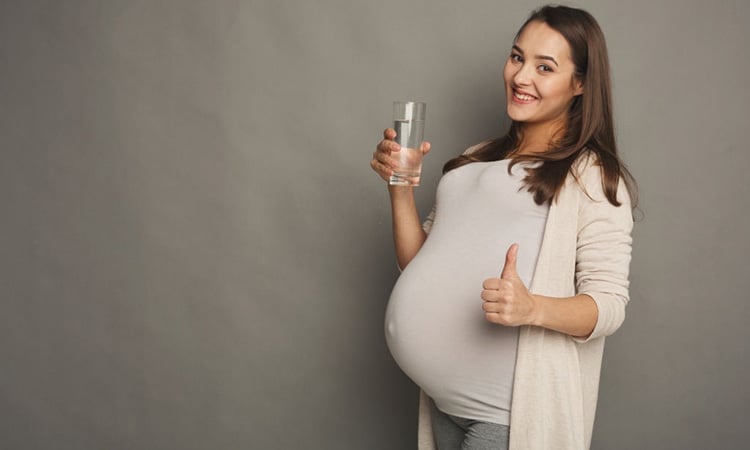
During pregnancy, the body’s need for water increases owing to the increased metabolism. This is why you should drink ample amount of fluids to stay hydrated during pregnancy.
Since the body undergoes different changes in each trimester, we have explained the water requirement of a pregnant woman during the trimesters.
Calculate Due Date With LMP
First trimester
Most pregnant women suffer from morning sickness during the first three months. Since you almost vomit out everything, the total water content in your body decreases below normal.
Sometimes, you can’t even keep water inside your stomach. Under such cases, you need to increase your body’s water, retaining capability in different ways. Try salted foods or change your diet to water-laden foods if you are suffering from severe morning sickness cases.
Second trimester
Since the appetite usually increases during the second trimester, your calorie intake will increase. To ensure that the digestion is smooth during the next three months, you need to drink more water.
According to studies, if you are in the second trimester, you must increase the daily water consumption by 340 mL to stay hydrated during pregnancy.
Third trimester
Since the significant risks from dehydration are in the third trimester. You need to increase your water content as per your body weight and calorie intake
Symptoms of dehydration in pregnancy
- Fatigue: Even though pregnancy might prove to be stressful, you will feel sleepy and tired only when your body lacks water
- Dry and scaly skin: When you will pregnant, your skin will glow, and there will be a fantastic radiance. But, in some cases, the skin can get dry and form scales. This usually happens when you are dehydrated
- Dizziness: Since your blood volume will increase during pregnancy to supply oxygen and nutrition to the fetus through the placenta, water deficiency will cause dizziness
How To Stay Hydrated During Pregnancy- 5 Tips
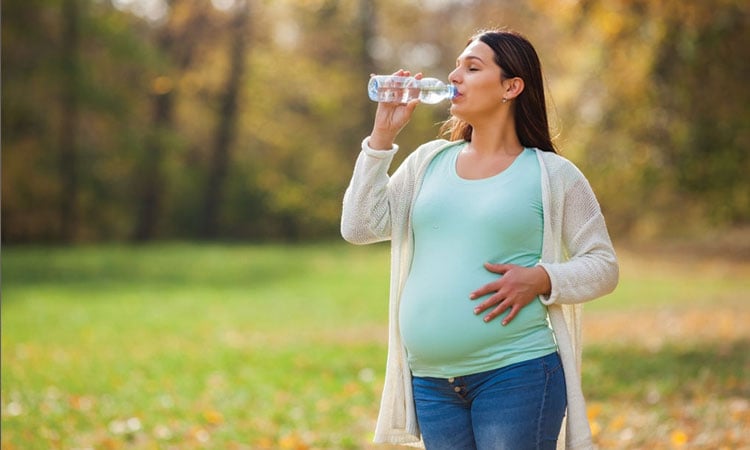
It’s not very difficult to stay hydrated during pregnancy. All you need to do is increase your fluid intake if you are having bad episodes of morning sickness or any other causes of dehydration. Now, since you will have mood swings and sudden food cravings, it’s normal if you hate the sight of water, let along drink eight to twelve glasses of that fluid.
Related Reading: 15 Home Remedies For Pigmentation During Pregnancy
There are only two solutions under such circumstances- first, you have to increase fluid consumption through pregnancy hydration drinks and foods, and second is to increase your body’s water retention ability.
Since you might not be familiar with staying hydrated, we have given here five helpful ways to stay hydrated during pregnancy.
1. Try salty foods
Most times, women avoid eating salty foods in fear of having high blood pressure since too much sodium can increase the systolic pressure in pregnant women. However, suppose your blood pressure is under control, and there is no such symptom of increased BP in the future. In that case, there must not be any problem in savouring he salted delicacies like potato chips, chorizo, fries, etc.
The salt in these foods will help your body to retain more water. As the blood’s sodium concentration will increase, water will be included in between the cells, thereby allowing you to stay hydrated during pregnancy.
2. Add flavour to water
Sometimes, you might suffer from water aversion during pregnancy where you won’t feel any desire to drink water, even when you are thirsty. This can cause severe dehydration cases, especially if your body continues to reject water through morning sickness.
For this reason, the best way to stay hydrated during pregnancy is by drinking flavoured drinks. From fruit juices to mocktails, smoothies, coconut water, and others, you can increase your fluid consumption in an entire day.
3. Start eating hydrating foods
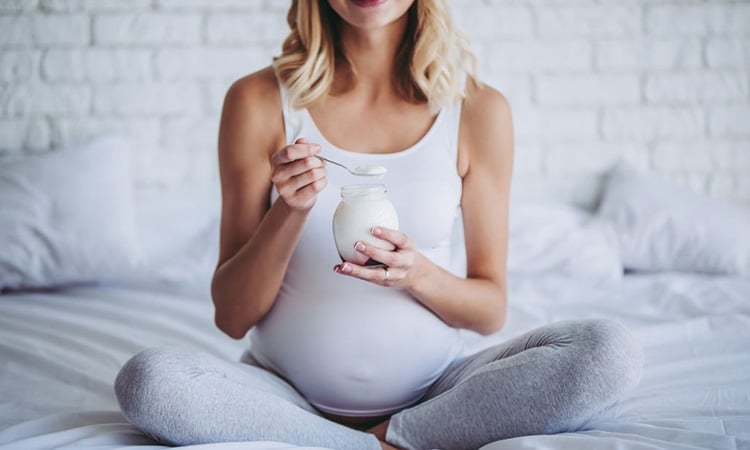
Another way of staying hydrated during your pregnancy is by changing your diet slightly to include water-filled foods. Yes, you might have some crazy ideas to eat weird food combinations. But cravings are sudden. You can easily prepare a diet chart where the meals will consist of healthy hydrating foods for pregnancy.
Some of these foods which will help you to prevent dehydration are:
- Fruits and vegetables: salads, baked, sauté, soup, salsa, puree
- Green leafy vegetables: broccoli, cauliflower, spinach, kale, sprouts, lettuce, and others
- Dairy products: yoghurt, almond milk, and coconut milk.
- Meat: pork, tenderloin, lamb, chicken
4. Cut down caffeine intake
Consuming too much caffeine is a significant cause for dehydration. This compound has a diuretic effect which increases the loss of fluids in the form of urine. For this reason, you need to cut down the consumption if you want to stay hydrated during pregnancy. Instead of coffee or black tea, you can start drinking decaffeinated drinks.
Related Reading: Can I Drink Green Tea During Pregnancy?
5. Do not wait for feeling thirsty
When you feel thirsty during pregnancy, it is a symbol for deficiency of fluids in your body. By the time you realize you have a parched throat or dry mouth, your body will have lost a considerable amount of water.
So, to prevent this, continue to take a sip or two every five to ten minutes. Carry a water bottle whenever you are travelling outside. Do not stall drinking of the fluid till you are feeling thirsty.
How To Stay Hydrated While Vomiting During Pregnancy?
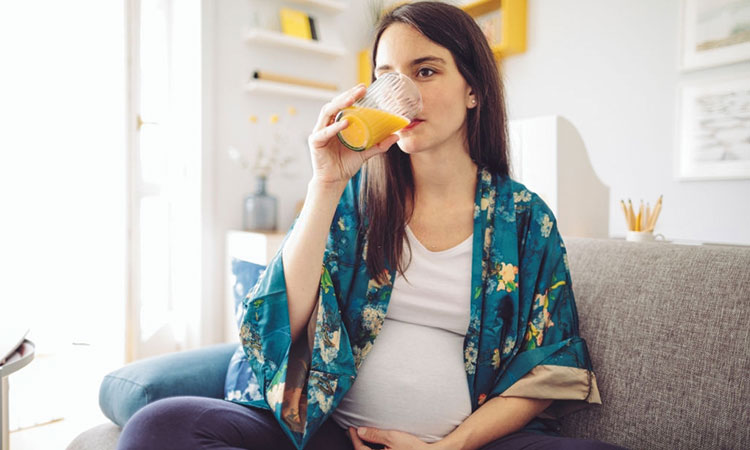
Morning sickness is common in every pregnant woman. Since you will lose a considerable amount of water due to continuous vomiting, it’s essential to know how to stay hydrated during pregnancy while suffering from morning sickness.
- Continue to take a few sips every ten to fifteen minutes
- Try out flavoured drinks or fruit juices as an alternate source of water
- Increase the water intake later during the day to compensate for the lost water
- Plan frequent meals with juicy foods to increase the fluid content
- Take proper vitamins to reduce morning sickness
Conclusion
It’s not easy to stay hydrated during pregnancy when you don’t have the urge to drink water or suffering from terrible morning sickness. But, since you can’t risk your baby’s health, the best option is to find alternatives to retain moisture and increase the intake simultaneously. Water is not only essential for us but also the little life growing inside your stomach.
